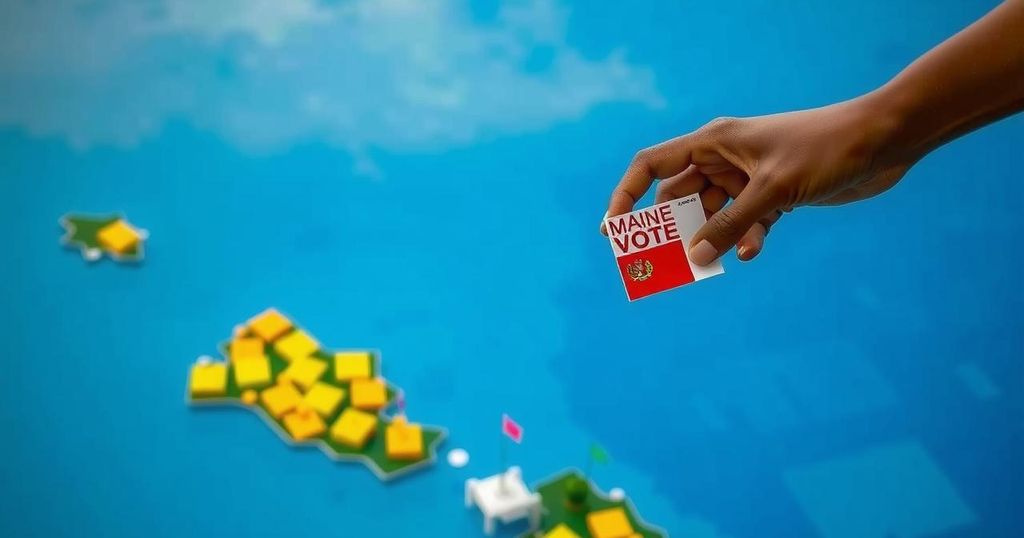World news
AFRICA, AFRICAN UNION, ALLIANCE OF CHANGE, BRITAIN, CHAGOS ISLANDS, DEMOCRACY, DEMONSTRATIONS, GOVERNMENT, INDIAN OCEAN, MAURITIUS, MILITANT SOCIALIST MOVEMENT, NATIONAL ASSEMBLY, NAVIN RAMGOOLAM, OPPOSITION, POLITICS, POPULISM, PR, PRAVIND JUGNAUTH, RAMGOOLAM, SHEILA
Daniel O'Connor
0 Comments
Mauritius Parliamentary Election: A Test of Democracy Amid Scandal
Mauritius held parliamentary elections amid a phone-tapping scandal that challenged the incumbent government’s credibility. The election centered on economic stability and included critical discussions about governance and corruption. Both main political parties claimed confidence in victory as voter turnout reached 70%. The election has broader implications for Mauritius’s democracy and political landscape.
Mauritius conducted a parliamentary election recently amidst a climate of political tension surrounding a phone-tapping scandal. The electoral process was viewed through the lens of economic and political stability within this democratic nation, especially after Britain’s recent cession of the Chagos Islands to Mauritius. This move initially bolstered incumbent Prime Minister Pravind Jugnauth’s re-election campaign, yet the leaked phone conversations of key political figures created significant challenges. In a controversial move to suppress the fallout, authorities imposed a ban on social media, which they later rescinded due to public pressure and backlash from the media. As voters approached the polls, two primary political factions battled for control of the National Assembly: Jugnauth’s Militant Socialist Movement and Navin Ramgoolam’s Alliance of Change. Both parties expressed confidence in their victory while pledging to tackle poverty and alleviate living costs. Despite reports of a 70 percent electoral turnout, with results anticipated shortly, fears regarding the integrity of the electoral process were voiced by Ramgoolam. Past incidents of corruption and governance issues left the electorate wary. The election’s significance was compounded by concerns over the nation’s democratic values, particularly regarding the erosion of civil liberties and the increased prevalence of corruption. Although Mauritius has maintained political stability since independence, analysts caution that issues such as procurement scandals and political oppression have emerged over recent years. The leadership landscape remains dominated by a few families, with the potential introduction of new political movements challenging longstanding political dynasties. Notably, the recent agreement concerning the Chagos Islands has been portrayed as a major milestone in Mauritius’s decolonization journey, albeit not without geopolitical implications.
Mauritius has a long-standing reputation as a stable democracy in Africa, characterized by a dynamic economy reliant on tourism and financial services. The recent parliamentary election was significant not only for political control but also due to recent events, such as the transfer of sovereignty over the Chagos Islands from Britain to Mauritius. This historical agreement was expected to influence public sentiment in favor of the ruling party. However, the leaked phone recordings of politicians highlighted persistent issues related to governance, public trust, and civil liberties, raising fears about democracy in the nation.
The parliamentary election in Mauritius emerged as a pivotal moment for the nation’s democratic integrity amidst a troubling phone-tapping scandal and significant governance challenges. As political factions vie for control, the electorate’s concerns over corruption and the erosion of liberties serve as critical factors influencing public opinion. Observers are keenly monitoring the aftermath of the elections to assess the future of governance and political stability in this strategically important Indian Ocean island.
Original Source: www.guampdn.com




Post Comment